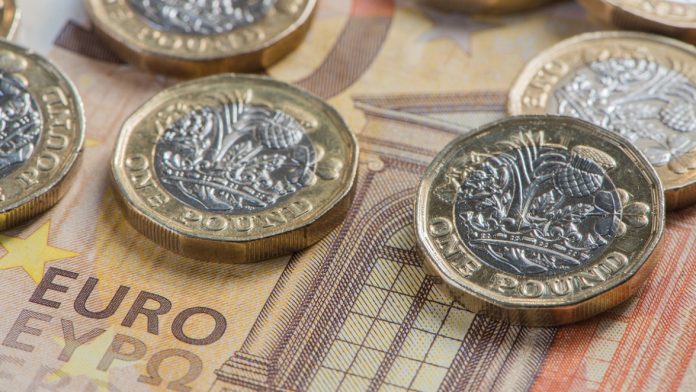The pound gained 0.7% versus the euro across the previous week on hopes that a no deal Brexit will be legally avoided. The pair closed at €1.1140 after reaching a 6-week high of €1.1183 earlier in the week. The pound is tumbling lower in early trade on Monday.
| What do these figures mean? |
| When measuring the value of a pair of currencies, one set equals 1 unit and the other shows the current equivalent. As the market moves, the amount will vary from minute to minute.
For example, it could be written: 1 GBP = 1.13990 EUR Here, £1 is equivalent to approximately €1.14. This specifically measures the pound’s worth against the euro. If the euro amount increases in this pairing, it’s positive for the pound . Or, if you were looking at it the other way around: 1 EUR = 0.87271 GBP In this example, €1 is equivalent to approximately £0.87. This measures the euro’s worth versus the British pound. If the sterling number gets larger, it’s good news for the euro. |
The pound experienced a turbulent week last week after Prime Minister Boris Johnson suffered two humiliating defeats in Parliament that left his Brexit strategy in tatters. One defeat compels Boris Johnson to request a three-month extension from the EU. The other was a rejection to hold a snap election. However, the prospect of an election is not off completely resolved after the Labour Party leader Jeremy Corbyn stated he would be in favour of an election once a no deal Brexit was off the table. Political analysts expect the anti-hard Brexit bill to be made into law this week, increasing the possibility of a general election.
The pound will face further volatility this week as Boris Johnson will press on with this Brexit plan, despite chaos in Westminster. The resignation of Amber Rudd, one of his most senior ministers and a vicious attack by Rudd on Boris Johnson’s approach to Brexit will add pressure to the PM. Boris Johnson is facing growing calls to abandon his aggressive stance towards his opponents and to drop is do or die Brexit pledge. However, his team believe that the Prime Minister is gaining the support of Leave voters. Signs that the UK is heading back towards the brink of a no deal Brexit is weighing on the pound on Monday.
| Why is a “soft” Brexit better for sterling than a “hard” Brexit? |
| A soft Brexit implies anything less than UK’s complete withdrawal from the EU. For example, it could mean the UK retains some form of membership to the European Union single market in exchange for some free movement of people, i.e. immigration. This is considered more positive than a “hard” Brexit, which is a full severance from the EU. The reason “soft” is considered more pound-friendly is because the economic impact would be lower. If there is less negative impact on the economy, foreign investors will continue to invest in the UK. As investment requires local currency, this increased demand for the pound then boosts its value. |
In addition to the political drama, pound investors will also digest a barrage of UK economic data. This includes UK GDP, industrial production and trade balance.
German Trade Balance In Focus
Demand for the euro was broadly mixed across the previous week as economic data was mixed. Concerns over the health of the German economy grew as German factory orders and German industrial production continued declining, fuelling fears of recession. Figures from Germany continued highlighting the damaging impact that the US — Sino trade dispute is having on Europe’s largest economy.
The European Central Bank’s highly anticipated September meeting occurs this week. Analysts expect the central bank to ease monetary policy in addition to signal further easing is on the way. However, the exact form that the stimulus measures will take is still unclear. It could be a rate cut or quantitative easing. This will be ECB President Draghi’s penultimate meeting. His tone and outlook on the eurozone could significantly impact the outlook for the euro.
| Why do interest rate cuts drag on a currency’s value? |
| Interest rates are key to understanding exchange rate movements. Those who have large sums of money to invest want the highest return on their investments. Lower interest rate environments tend to offer lower yields. So, if the interest rate or at least the interest rate expectation of a country is relatively lower compared to another, then foreign investors look to pull their capital out and invest elsewhere. Large corporations and investors sell out of local currency to invest elsewhere. More local currency is available as the demand of that currency declines, dragging the value lower. |
Prior to Thursday’s meeting, investors will be looking at today’s German trade balance and the eurozone investor confidence figures. These could weigh on demand for the euro.
Currencylive.com is a site operated by TransferWise Inc. (“We”, “Us”), a Delaware Corporation.
The content on our site is provided for general information only. It is not intended to amount to advice on which you should rely. You must obtain professional or specialist advice before taking, or retain from, any action on the basis of the content on our site.
Although we make reasonable efforts to update the information on our site, we make no representations, warranties or guarantees, whether express or implied, that the content on our site is accurate, complete or up to date. Some of the content posted on this site has been commissioned by Us, but is the work of independent contractors. These contractors are not employees, workers, agents or partners of TransferWise and they do not hold themselves out as one. The information and content posted by these independent contractors have not been verified or approved by Us. The views expressed by these independent contractors on currencylive.com do not represent our views.





